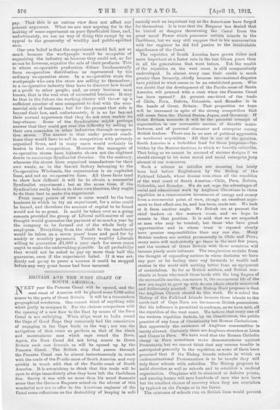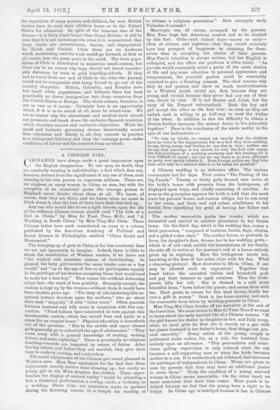BRITAIN AND THE W MST COAST OF SOUTH AMERICA.
NEXT year the Panama Canal will be opened, and the west coast of America will be placed some 7,000 miles nearer to the ports of Great Britain. It will be a tremendous geographical revolution. One cannot think of anything with which justly to compare it. For the obvious comparison with the opening of a new door to the East by means of the Suez Canal is not satisfying. When ships went to India round the ()ape of Good Hope they commonly had the consolation of engaging in the Cape trade on the way ; nor was the navigation of that route so perilous as that of the bleak and mountainous seas which rage round the Horn. Again, the Suez Canal did not bring nearer to Great Britain such vast littorals as will be opened up by the Panama Canal. The British ship that passes through the Panama Canal can be almost instantaneously in touch with the trade of the Posifie coast of South America and very quickly in touch with that of the Pacific coast of North America. It is astonishing to think that this trade will be open to ships immediately after they have left the Caribbean Sea. Surely it was with no more than his usual dramatic sense that the German Emperor seized on the advent of this wonderful new era to offer to the American engineer of the Canal some reflections on the desirability of keeping in safe
custody such an important key as the Americans have forged for themselves. It is true that the Emperor has denied that he hinted at dangers threatening the Canal from the great naval Power which possesses certain islands in the Caribbean, but we may still suppose that in his conversation with the engineer he did full justice to the incalculable significance of the Canal.
The republics of South America. have grown richer and more important at a faster rate in the last fifteen years than in all the generations that went before. Yet the wealth of the republics on the west coast is still comparatively undeveloped. In almost every case their credit is much greater than formerly, chiefly because international disputes have yielded to what seems to be an established peace. Who can doubt that, the development of the Pacific coast of South America will proceed with a rush when the Panama Canal has been opened ? At present one-third of the trade of Chile, Peru, Bolivia, Colombia, and Ecuador is in the hands of Great Britain. That proportion we hope will be increased in spite of the strong competition that will come from the United States, Japan, and Germany. If Great Britain succeeds it will be the peaceful triumph of organization in our mercantile marine, of durable manu- factures, and of personal character and enterprise among British traders. There can be no sort of political aggression or territorial acquisition. All that is out of the question, South America is a forbidden land for those purposes—for» bidden by the Monroe doctrine, to which we heartily subscribe. That being so we cannot be accused of sinister designs if we should attempt to let some moral and social enterprise keep abreast of our commerce.
Such a scheme as satisfies our meaning has lately been laid before Englishmen by the Bishop of the Falkland Islands, whose diocese comerises all the republics of the west coast of South America--Chile, Peru, Bolivia, Colombia, and Ecuador. We do not urge the advantages of social and educational work by Anglican Christians in these republics as a remunerative investment of energy and money from a commercial point of view, though an excellent argu- ment to that effect can be, and has been, made out. We look at it from another angle. We British are at present the chief traders on the western coast, and we hope to remain in that position. It is said that we are respected as men who may be trusted; but those who have great opportunities and in whom trust is reposed clearly have greater responsibilities than any one else. Many British traders are settled permanently in Chile and Peru; many more will undoubtedly go there in the next few years, and the contact of Great Britain with these countries will become yearly more intimate. The imagination shrinks from the thought of expanding nations in whose destinies we have any part or lot feeling their way forwards to wealth and station in the world with nothing better than an equipment of materialism. So far as British settlers, and British mer- chants at home who touch these lands with the long fingers of the mercantile marine, can ensure it, the commercial life of the now era ought to grow up with decent ideals clearly conceived and deliberately planted. What Bishop Blair proposes is that the Anglican Church should do this work. He is called the Bishop of the Falkland Islands because those islands to the north-cast of Cape Horn are the nearest British possessions. But his influence is permitted to embrace, as we have said, all the republics of the west coast. We believe that every one of the western republics forbids, by its Constitution, the public practice of any form of Christianity but Roman Catholicism.
But apparently the existence of Anglican communities is tacitly allowed. Certainly there are Anglican churches at Lima and Cuzco in Peru. We have read that the Roman Catholic clergy in Peru sometimes make demonstrations against Protestants, but we cannot think that any sermons trouble is
anticipated generally in the republics, as serum of them have promised that if the Bishop founds schools in which an undenominational Protestantism is to be taught they will help those schools with subsidies. The Bishop proposes to
build churches as well as schools and to establish a medical organization. Chaplains will be stationed at definite points, and nursing-homes will save hundreds of men who now have but the smallest chance of recovery when they are overtaken by typhoid on the Pampa or in the Cerro.
The existence of schools run on British lines would prevent the separation of many parents and children, for now British traders have to send their children home or to the United States for education. In spite of the immense size of the diocese—it is forty times larger than Great Britain—it will be seen that it is not unmanageable when it is remembered that large tracts are mountainous, barren, and unpopulated. In North and Central Chile there are no harbours worth mentioning, and the work would go forward, at first at all events, near the great ports in the south. The town popu- lation of Chile is distributed in numerous small centres, but there can be no reason why boys should not travel consider- able distances by train to good boarding-schools. If they had to travel from one end of Chile to the other the journey would not be comparable with being forced to go out of the country altogether. Bolivia, Colombia, and Ecuador have but small white populations, and hitherto there has been practically no direct immigration into these countries from the United States or Europe. Tho whole scheme, therefore, is not so vast as it seems. Certainly here is an opportunity which, if it is to be seized at all, must be seized soon. We see no reason why the educational and medical work should not permeate and break down the exclusive Spanish tradition which cherishes narrow and exclusive oligarchies. While the small and inelastic governing classes theoretically accord free education and liberty to all, they consent in practice to a widespread illiteracy and keep the unhappy peons under conditions of labour not far removed from servitude.







































 Previous page
Previous page